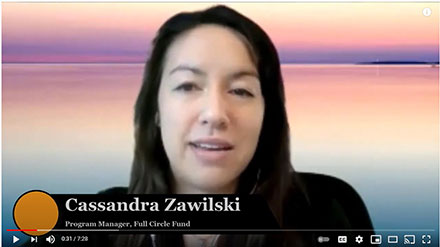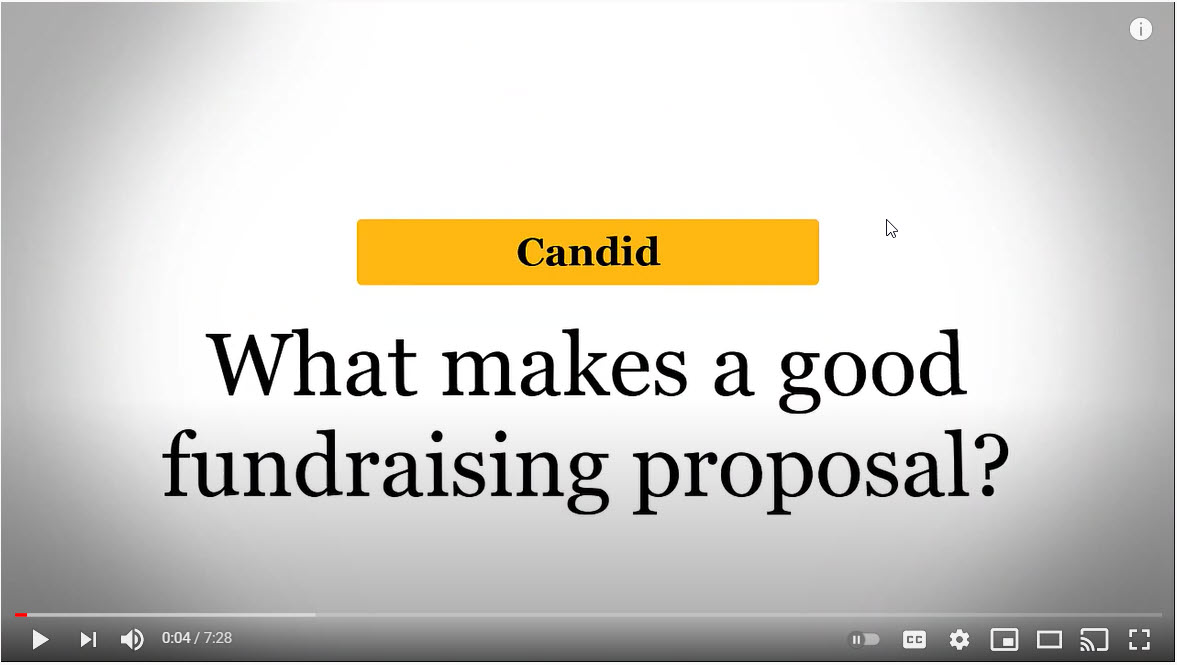Think like a funder: What makes a good fundraising proposal

Cassandra Zawilski, program manager for Full Circle Fund in San Francisco, proved to be an invaluable addition to our virtual Leadership Circle for Emerging Development Professionals last year. I first met Cassie when she was a fellow letter of inquiry reviewer when we were doing Proposal Writing Boot Camps in person in San Francisco. Our boot camp trainers were always impressed at how professional, straightforward, and thorough she was as well as by her dedication to advancing the nonprofit sector. In fact, she was scheduled to be a reviewer for our March 2020 boot camp when the pandemic hit.
We had to postpone the boot camp while we designed a virtual offering, so I asked if Cassie would consider helping us in a different capacity. Without hesitation, she accepted my invitation to be a part of our virtual Leadership Circle for Emerging Development Professionals in April. We featured her as a guest speaker in our “think like a funder” session. Hearing her point of view proved to be incredibly useful to participants. Cassie gave an overview of what makes a good fundraising proposal and essentially outlined everything we teach about proposal writing.
Not only did she lay out what makes a great fundraising proposal and candidly answer all our participant’s questions, she even invited them to make a pitch to her, live, in case the opportunity to speak to a foundation program officer about their program should arise. Participants found this elevator pitch idea especially useful, and several took on the challenge in the few minutes we had scheduled for this activity. They gained valuable insight from not only Cassie but from their peers as well.
After the second round of the leadership circle in October, I scheduled a feedback call with Cassie. Participants had been so enthusiastic about the Q&A and elevator pitch, but they also very much appreciated her insight on proposal writing. I suggested that maybe we could use her limited amount of time more efficiently by sending out a video of her fundraising proposal writing presentation beforehand, which would give us more time to practice elevator pitches and answer questions. She loved the idea, and we now plan to offer her video to all upcoming leadership circle participants to watch before the session, giving them the chance to get all their questions answered as well as practice and deliver a live pitch to a funder.
Hear what Cassie has to say:
Transcript
Cassie Zawilski: So I love when an organization has done their homework. It becomes really clear when they’ve read the guidelines or they have a clear idea of what we do because their proposal will be personalized and customized to the work of the foundation.
And it’s really helpful when there’s a clear ask, especially upfront, not have it buried at the very end and with just a clear statement about either how the project connects with the funder’s goals or how the organizations work next to the funder’s goals. So outline, being clear about, connecting the dots basically for the funder.
Because oftentimes when I’ve seen some fundraising proposals is they tend to be more scattershot, and it’s really clear that they’ve just send a cookie cutter proposal to a bunch of funders in hopes that one of them will read it and want to fund them. And I see a proposal more as like a cover letter for a job, where you have to customize it a bit and show that you know what they’re all about. Because do you even want to work with a funder if they don’t share the same values as you. Because otherwise they’re going to have some of those horror story experiences.
I think some proposals also are able to elaborate on the needs. So why now, or why your organization, making that really clear for the, for the funder. So sharing that. What’s the window of opportunity, because funders are often trying to juggle who, which, what is most urgent versus most important versus what something long term that we should support versus the short term. So some funders are like much more oriented more rapid response, like being really nimble, and then some are thinking way ahead and maybe want to support more systemic change work.
I think what’s also helpful, sometimes with projects, is having timelines and expected outcomes and how you’ll evaluate them. I think really often there’s sometimes goals that are set, and it’s not clear, like how they actually measure success. So being able to include that.
Other things that have been helpful, I think if you’re more of a startup organization, it’s really helpful to know the track record of the leadership that’s running the organization. So if you don’t have that organizational track record because they’re so new, I think knowing, like what has the management or staff or board who’s part of this or what have they been able to do together in the past or on their own. So sort of demonstrating that you have that leadership.
I think sharing key partners is also really helpful. So, not only, that might not just be funders that are already supporting your work, because that helps for funders who are more hesitant to support early stage things or things that are requesting seed funding, they like to see that other people have already support, are already in support of your mission, and so that helps them, give them the extra push. But also I, as a funder, really like seeing who are you collaborating with. So I think what often happens is that philanthropy really creates this competitive … like it’s nonprofits against one another because they’re often asking, what makes you so unique, compared to all these other similar organizations.
And what I prefer to ask is who are you in relationship with, because I see each nonprofit as complementing each other’s work and each of them having their own strengths in which they can benefit their communities. And so I like to know who else are you working with in that particular issue area or sector.
I think also, in part because I also want to know, do you actually know who’s around you? I think especially if you’re an earlier organization, if you don’t mention any of these other similar orgs, I wonder if you’ve really done your homework. And if you’re, if you’re someone who wants to collaborate with others, or if you’re someone who just wants to be the pioneer or the best in the field. And that’s something that I personally am resistant against, both on the funder side and the nonprofit side. I want, I wish funders also wouldn’t push that competitive nature, and I also wish funders themselves would collaborate more, especially if they’re asking nonprofits to collaborate.
Those are most of the things. I think being able to share a track record of success for your organization, that just really shows your capacity and your credibility and your commitment to achieving some success. If you are replicating any existing models, that’s really helpful. Especially if your work may be based on best practices or promising practices, being able to cite that as evidence that this is something we’re doing in this particular city that’s been done elsewhere. That just creates some legitimacy to what you’re building.
And then I think focusing also on what are the outcomes and impact and not just the inputs and outputs. So inputs would be the people and resources to make your program services happen, and outputs typically are the quantitative things, like the number of people you serve or hours of programming. Funders really like to see what are the outcomes. So what have been the change and stakeholders or the change in your beneficiaries. And harder to measure, but I think funders really care about impact. What’s that change in your community on a larger scale.
And then … see what else. And if there’s any ways to include other sources when referring to research, be sure to do that. Cuz I’ve often seen fundraising proposals that will state certain statistics or statements, and it’s not clear where this information came from. I’m really big on attribution. So that’s something I personally like to see
Other things … Yeah, I think if you’ve done your homework, it becomes a lot easier to write the fundraising proposal, because you’re writing to, you’re basically trying to … I think with employers as with funders, they’re trying to support or fund the thing that is within their issue area. So they are excited to read proposals that are just, you are the answer to figuring out, to achieving our own mission and goals. So I think it’s important if you’re able to make that clear to them.
But I also think in a fundraising proposal, or in an LOI, like a letter of inquiry, if you can be really clear and have some brevity in it, and not go on and on. … I personally don’t like a lot of jargon in my proposals. I want to be able to tell what exactly it is you’re doing and not have it covered up in buzzwords. Cuz otherwise, what happens is it tends to sound very similar to a lot of other nonprofits, because they’re all using that same buzz-worthy language. So I think just being really upfront about these are exactly our programs and this is how we do them, it’s helpful.








Laura Bergman says:
Hi Monique,
I'm so glad you found it useful! And I understand--it is not an easy time as nonprofits. Most are more likely to have success with pre-existing funders that are already invested in their mission and organization. I suggest that when your organization is approaching a new funder, prioritize those with a vested interest in your region or mission. We call it "finding the fit," which means ensure that your nonprofit's mission aligns with their giving strategy as closely as possible. We have plenty of resources at Candid to help you. Here are just a few:
• Resources for nonprofits during the COVID-19 crisis: https://blog.candid.org/post/candid-resources-to-advance-your-work-during-the-coronavirus-crisis/
• How to approach foundations before making a request: https://learning.candid.org/resources/knowledge-base/approaching-foundations/
• And last, information on finding grants and writing a proposal: https://learning.candid.org/resources/knowledge-base/finding-grants/ and https://learning.candid.org/training/courses/introduction-to-proposal-writing/
These resources are a great place to start, but we have plenty more on https://learning.candid.org/.
Hope this helps!
Laura
Monique Wilson says:
Laura, this was so helpful. I was awarded my 501c3 and Covid19 kicked in, I tell you this has been such a disappointment. I have been trying to fundraise but need help or training, what do you suggest?